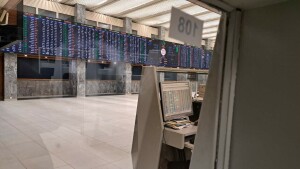Credit default swaps on J. Sainsbury Plc leapt on Friday, as a trio of private equity houses said they were considering a buyout of the British grocer, sending shockwaves through the UK retail sector.
CVC, Kohlberg Kravis Roberts and Blackstone said they were in the early stages of assessing a possible bid for Sainsbury. Private equity bids are heavily debt-funded and usually sharply reduce the credit quality of the target company.
Sainsbury has no existing bonds for CDS contracts to insure after it securitised its debt last year, selling commercial mortgage-backed securities and buying back its unsecured bonds.
But market participants bet a buyout could burden Sainsbury with fresh debt that CDS would insure - making the contracts far more valuable than if no debt is "deliverable" against them.
Five-year default swaps on Sainsbury jumped 50 basis points to 80 basis points, traders said, meaning it costs 80,000 euros a year to insure 10 million euros of its debt against default. "The situation we have here is a retailer with no deliverable obligations," said Clark McPherson, a credit analyst at Credit Suisse.
"But the CDS has widened aggressively, and that is due to the anticipation that if we get a successful bid here, there is potential that deliverable obligations are put back into the structure."
Default swaps on a host of other British retailers, including Tesco, Alliance Boots, Kingfisher and Safeway - now part of Morrison - rose in sympathy, traders said. Investors were speculating the interest in Sainsbury could foreshadow buyout approaches across the sector, one credit trader said. "People are just bidding everything up," he said.
Five-year credit default swaps on Safeway rose about 12 basis points to a 38.5 basis point mid-price, while those on Kingfisher rose about 3.5 basis points to 57.5 basis points, he added.
In the wider market, the iTraxx Crossover index, a bellwether for sentiment about riskier European credit, tightened 2.5 basis points to 192.5 basis points after payrolls data showed the US economy added a weaker-than-expected 111,000 jobs in January but hiring for the previous three months was stronger than earlier estimates.
In the high-yield market, bonds of Italy's Teksid Aluminium plunged after Teksid said it would only be able to pay bondholders about half their money back under a tender offer, having warned in January it would miss an interest payment.
Teksid's 11.375 percent bonds due 2011, which total 240 million euros, fell 19 percentage points to around 63 percent of face value by 1335 GMT, a high-yield trader said.
Teksid, which makes aluminium engine castings, had offered to buy back the bonds after announcing a sale of assets to Mexican automotive supplier Tenedora Nemak SA de CV, to raise much-needed cash. But in December it terminated the buyback offer.
On Friday Teksid said it would offer to buy back some bonds at par, but the total cash available to bondholders would be 500 to 550 euros per 1,000 euros of senior notes, assuming various asset sales, including the Nemak deal, went ahead.
Elsewhere, default swaps on steelmaker Corus tightened another 10 basis points to 170 basis points, the trader said, on continued speculation about whether debt financing its acquisition by India's Tata Steel would be deliverable against the contracts.
Tata is expected to buy back Corus' existing bonds as part of the financing for the deal, but the market is betting that there will be loan debt deliverable under the contracts, the trader said.
BR100
15,115
Increased By
28.1 (0.19%)
BR30
43,048
Increased By
175.6 (0.41%)
KSE100
149,493
Increased By
257.8 (0.17%)
KSE30
45,518
Increased By
11.6 (0.03%)























Comments
Comments are closed.